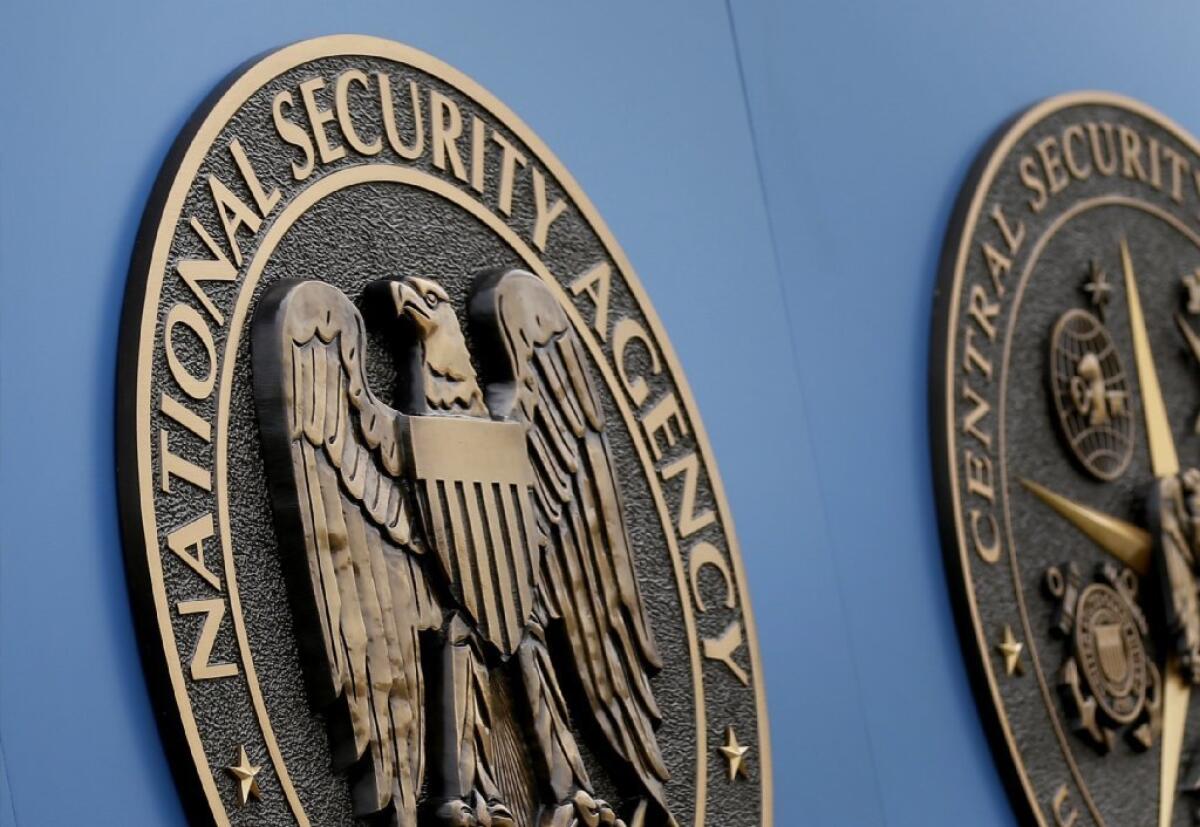Editorial: Protecting privacy from U.S. spies

A sign is seen outside the National Security Agency campus in Fort Meade, Md.
- Share via
Most of the public and congressional concern about the National Security Agency’s electronic surveillance programs has focused on the bulk collection of Americans’ telephone “metadata” under a strained interpretation of the Patriot Act. That’s understandable, given the indiscriminate nature of the program. Fortunately, President Obama has now directed that the government obtain court approval before “querying” or searching the database of Americans’ phone records, and legislation moving forward in Congress would end government storage of the records.
But the metadata program is only one way in which the intelligence community can obtain access to the communications of Americans. Under Section 702 of the Foreign Intelligence Surveillance Act, the NSA can collect the actual contents of the phone calls, emails, text messages and online chats of Americans who are in touch with foreign targets of surveillance outside the United States. That can happen even if the U.S. citizen isn’t in direct contact with the foreign target but happens to include the target’s email address in the body of a message.
This week the Privacy and Civil Liberties Oversight Board, a watchdog panel created to monitor surveillance efforts after Sept. 11, issued a report on Section 702 surveillance that praised the program’s effectiveness. But the report also acknowledged “privacy concerns” and made recommendations to address them. Some of the proposals don’t go far enough.
There are two ways in which this program can violate the privacy of Americans. (It also intrudes on the privacy of foreigners, and the privacy board concedes that the surveillance of foreign citizens “raises important but difficult legal and policy questions.”)
The first concern, as with the government’s acquisition of phone records, is that Section 702 surveillance allows the government access to the communications of U.S. citizens even if there is no showing of individualized suspicion. The law does includes provisions designed to “minimize” the amount of information that is incidentally collected, but that doesn’t mean the information is promptly purged. Meanwhile, investigators can search or “query” a database of hundreds of millions of captured communications linked to foreign targets by entering the name or other information associated with a U.S. citizen.
Most of the members of the privacy board recommended that the NSA and the Central Intelligence Agency instruct agents to search information using a “U.S. person identifier” only if it is reasonably likely to return information about foreign intelligence or terrorism. Two board members, Chairman David Medine and Patricia Wald, went further, arguing that the government should have to get the permission of the Foreign Intelligence Surveillance Court before making such a search. And if the search doesn’t turn up foreign intelligence information, they argued, the data should be purged. That makes sense.
A second way in which foreign intelligence surveillance can undermine Americans’ rights has to do with criminal prosecutions. Under current law, if intelligence analysts monitoring a foreign target discover evidence that a U.S. citizen or permanent resident has committed a crime, they can pass that information on to law enforcement agencies. The result could be the criminal conviction of a U.S. citizen on the basis of information gathered without a search warrant based on probable cause, as required by the 4th Amendment.
The privacy board report suggested rather vaguely that “some additional limits” be placed on the FBI’s ability to search foreign communications for evidence of criminal conduct by Americans. Medine and Wald argued that such a search should take place only if a judge decides that it is “reasonably likely” to produce evidence of criminal wrongdoing.
We would go even further than Medine and Wald and adopt the recommendation of another group that considered this issue, Obama’s Review Group on Intelligence and Communications Technologies. That panel said that evidence gathered under Section 702 should not be used “in any proceeding” against a U.S. person. Collecting intelligence about foreign terrorism is a national priority, but so is abiding by the letter and spirit of the Constitution.
More to Read
A cure for the common opinion
Get thought-provoking perspectives with our weekly newsletter.
You may occasionally receive promotional content from the Los Angeles Times.






